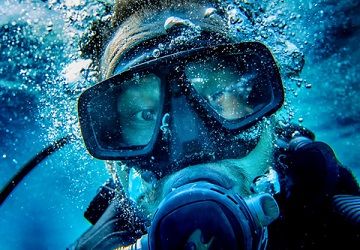- Best Practices New Normal
- Digital Dentistry
- Data Security
- Implants
- Catapult Education
- COVID-19
- Digital Imaging
- Laser Dentistry
- Restorative Dentistry
- Cosmetic Dentistry
- Periodontics
- Oral Care
- Evaluating Dental Materials
- Cement and Adhesives
- Equipment & Supplies
- Ergonomics
- Products
- Dentures
- Infection Control
- Orthodontics
- Technology
- Techniques
- Materials
- Emerging Research
- Pediatric Dentistry
- Endodontics
- Oral-Systemic Health
Why You Should Ask Your Dental Patients if they SCUBA Dive
A recent pilot study conducted by a dental student at the University of Buffalo found that the rigors of SCUBA diving can lead to oral pain and dental issues. The findings were published in the most recent issue of the British Dental Journal.

In addition to the usual questions you ask new patients on your intake form, you might want to add a new one: Do you SCUBA dive?
A recent pilot study conducted by a dental student at the University of Buffalo found that the rigors of SCUBA diving can lead to oral pain and dental issues. The findings were published in the most recent issue of the British Dental Journal.
The researcher, Vinisha Ranna, BDS, who is herself an active SCUBA diver, circulated a survey through social media platforms pertaining to diving. She then whittled her sample size of survey participants down to a 100 recreational divers. The study looked at “diver demographics, diving characteristics (level of certification, number of dives completed), occurrence of dental problems during a dive, and details of the episode.”
Data indicated that 41 percent of respondents experienced some dental distress during dives. Frequently reported problems, according to a news release from the University of Buffalo, included tooth, jaw and gum pain, loosened crowns, and damage to dental fillings. The most commonly reported issue was barodontalgia. The study concluded that — though this is a small sample size and there may be biases at play, due to the study recruiting methods – “a high proportion of recreational divers may experience dental symptoms during a dive.”
The news release adds that the symptoms are likely a result of the changes in atmospheric pressure under water, as well as the jaw clenching required to keep an air regulator in place.
The primary takeaway for dentists is, if you know your patient is an active SCUBA diver, you want to ensure that decay issues and damaged restorations are resolved prior to a dive. It’s also worth asking about the type of SCUBA mouthpiece the diver is using. Some divers complained of temporomandibular pain while SCUBA diving.
“Divers are required to meet a standard of medical fitness before certification, but there are no dental health prerequisites,” Ranna said in the university’s news release. “Considering the air supply regulator is held in the mouth, any disorder in the oral cavity can potentially increase the diver’s risk of injury. A dentist can look and see if diving is affecting a patient’s oral health.”
